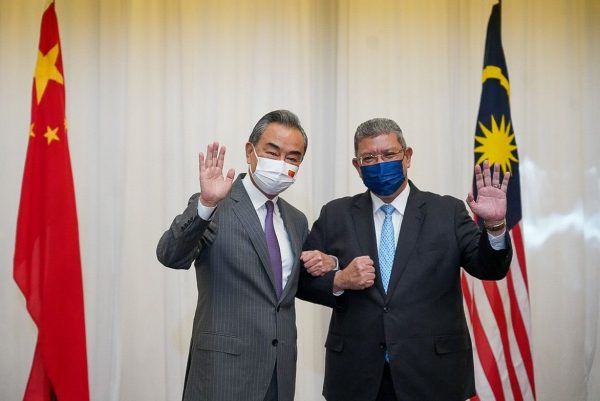
Chinese Foreign Minister Wang Yi yesterday pledged to speed up consultations with the Association of Southeast Asian Nations (ASEAN) on the long-awaited Code of Conduct for the South China Sea. While it is unlikely to signal much progress on the perennially promised agreement, it does offer an insight into how Beijing is seeking to counter the recent U.S. diplomatic offensive in the region.
Wang made the comments during a meeting with Malaysian Foreign Minister Saifuddin Abdullah in Putrajaya, the final stop of a five-nation tour of Southeast Asia that has also taken him to Myanmar, Thailand, the Philippines, and Indonesia.
According to a report by Malaysian state media agency Bernama, Wang pledged that China would speed up consultations on the Code of Conduct (COC) and “advocate true multilateralism and advanced open regionalism.”
“We will uphold ASEAN centrality and the ASEAN Regional Cooperation Framework,” he promised. “We will oppose confrontation and cold war mentality.”
The Code of Conduct (COC) is intended to reduce the risk of conflict in the South China Sea in the disputed waterway where China’s expansive maritime and territorial claims clash with those of four ASEAN member states: Vietnam, Malaysia, the Philippines, and Brunei. The COC has been a perennial agenda item for China and ASEAN since the turn of the century, but its realization remains far off, despite some predictions that Cambodia, the current chair of ASEAN and a close friend and partner of China, might use its chairmanship to push the COC over the finish line.
Against this backdrop of glacial progress, it is foolish to view Wang’s comments as anything other than an attempt to play for time while China’s growing naval power creates facts on the ground in disputed parts of the South China Sea. But the persistent focus on the COC reflects Beijing’s broader push for Southeast Asian nations to view Western interventions on the South China Sea disputes as the interventions of outside powers. It also reflects China’s broader message, one that it has underlined since the onset of the COVID-19 pandemic, which contrasts Beijing’s proximity to and persistent engagement with Southeast Asia with the fleeting, episodic, and allegedly destabilizing nature of U.S. involvement.
For instance, during his talk with Saifuddin, Wang said that he felt “deeply and strongly the urgent need and bright prospects for enhanced cooperation between China and ASEAN,” adding, “The people of China and ASEAN countries have been interacting in this piece of land with one another for over millennia and no one can separate this. No one can stop us from marching towards development and multilateralism.”
Wang made a similar statement during his stop in Indonesia, when he said that Southeast Asian nations should avoid “being used as chess pieces in major power rivalry and from coercion.” He added, “The future of our region should be in our own hands.”
These comments contained more than a hint of the speech that China’s supreme leader Xi Jinping gave in 2014, when he called for “Asian people to uphold Asia’s security.” While the speech has been subject to various interpretations, and some have questioned whether it represented Beijing’s active call for the U.S. to be pushed out of East Asia, it certainly reflects a desire to minimize Washington’s influence, and to paint it as an “outside” power. Unfortunately for the U.S., the message has only been aided by the unfocused and scattershot nature of recent American engagement with Southeast Asia.
Chinese FM Pledges Progress on South China Sea Code of Conduct
Source: Frappler

0 Comments